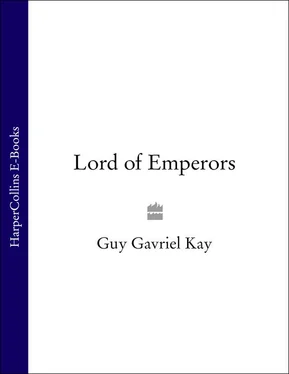1 ...6 7 8 10 11 12 ...32 He stood alone in the front room of his own small house amid the burning of lamps and the firelight and he thought about fate and the chance moments that shaped a man’s life, and about Sarantium.
Chapter II
Pardos had never liked his hands. The fingers were too short, stubby, broad. They didn’t look like a mosaicist’s hands, though they showed the same network of cuts and scratches all the others’ did.
He’d had a great deal of time to think about this and other things on the long road in wind and rain as autumn steadily turned to winter. Martinian’s fingers, or Crispin’s, or Pardos’s best friend Couvry’s— those were the right shape. They were large and long, appearing deft and capable. Pardos thought his own hands were like a farmhand’s, a labourer’s, someone in a trade where dexterity hardly mattered. It bothered him, sometimes.
But he was a mosaicist, wasn’t he? Had finished his apprenticeship with two celebrated masters of the craft and had been formally admitted to the guild in Varena. He had his papers in his purse now, his name was entered on the rolls back home. So appearance wasn’t really important, after all. His short, thick fingers were nimble enough to do what needed to be done. The eye and the mind mattered, Crispin used to say before he went away; the hands could learn to do what they were told.
It seemed to be true. They were doing what needed to be done here, though Pardos would never have dreamt that his first labours as a fully-fledged mosaicist would be expended in the remote, bitterly cold wilderness of Sauradia.
He would never have even dreamt, in fact, of being this far away from home, and on his own. He had not been the sort of young man who imagined adventures in distant places. He was pious, careful, prone to worry, not at all impulsive.
But he had left Varena—his home, all he knew of Jad’s created world—almost immediately after the murders in the sanctuary, and that was about as impulsive an action as could be imagined.
It hadn’t felt as though he was being reckless, it seemed rather as if there was no real choice in the matter, and Pardos had wondered why the others couldn’t understand that. When pressed by his friends, and by Martinian and his concerned, kind-hearted wife, Pardos had only said, over and over, that he could not stay in a place where such things were done. When they told him, in tones of cynicism or sadness, that such things happened everywhere, Pardos replied—very simply—that he hadn’t seen them everywhere, only in the sanctuary expanded to house the bones of King Hildric outside Varena.
The consecration of that sanctuary had been the most wonderful day of his life, at first. He and the other former apprentices, newly elevated to the guild, had been sitting with Martinian and his wife and with Crispin’s white-haired mother in places of honour for the ceremony. All the mighty of the Antae kingdom were there, and many of the most illustrious Rhodians, including representatives of the High Patriarch himself, had come to Varena along the muddy roads from Rhodias. Queen Gisel, veiled and clad in the pure white of mourning, had been sitting so near that Pardos could almost have spoken to her.
Except that it hadn’t been the queen. It had been a woman pretending to be her, a lady-in-waiting. That woman had died in the sanctuary, and so had the queen’s giant, silent guard, chopped down by a sword that should never have been in a holy place. Then the swordsman— Agila, Master of Horse—had himself been slain where he stood by the altar, arrows whipping down from overhead. Other men had died the same way, while people screamed and trampled each other in a rush for the doors and blood spattered the sun disk beneath the mosaics Crispin and Martinian and Pardos and Radulph and Couvry and the others had laboured to craft in honour of the god.
Violence, ugly and profane, in a chapel of worship, a desecration of the place and of Jad. Pardos had felt unclean and ashamed—bitterly aware that he was Antae and shared the blood, and even the tribe, as it happened, of the foul-tongued man who had stood up with his forbidden sword, smeared the young queen with ugly, vicious words, and then died there with those he’d killed.
Pardos had walked out the double doors into the sanctuary yard even as the services—under the orders of the sleek chancellor, Eudric Golden hair—had resumed. He had gone past the outdoor ovens where he’d spent a summer and fall attending to the setting lime, out through the gate and then along the road back to the city. Before he’d even reached the walls he had decided he was leaving Varena. And almost immediately after that he’d realized how far he intended to go, though he’d never been away from home in his life and winter was coming.
They’d tried to dissuade him later, but Pardos was a stubborn young man and not easily swayed when his mind and heart were set. He needed to put a distance between himself and what had happened in that sanctuary—what had been done by his own tribe and blood. None of his colleagues and friends were Antae, they were all Rhodian-born. Perhaps that was why they didn’t feel the shame as fiercely as he did.
Winter roads to the east might have their dangers, but as far as Pardos was concerned, they could not be worse than what was about to happen here among his people with the queen gone and swords drawn in holy places.
He wanted to see Crispin again, and to work with him, far away from the tribal wars that were coming. Coming again. They had been down this dark path before, the Antae. Pardos would go a different direction this time.
They’d had no word from Martinian’s younger, more intense partner since a single relayed message sent from a military camp in Sauradia. That letter hadn’t even been addressed to them, it had been delivered to an alchemist, a friend of Martinian’s. The man—Zoticus was his name—had passed on word that Crispin was all right, at least to that point in his journey. Why he’d written the old man and not his own partner or mother was not explained, or at least not to Pardos.
Since then, nothing, though Crispin would probably have reached Sarantium by now—if he’d reached it at all. Pardos, with his own decision to leave now firm in his mind, latched onto an image of his former teacher and announced an intention to follow him to the Imperial City.
When they realized he wasn’t to be dissuaded, Martinian and his wife Carissa turned their considerable energies to making sure Pardos was properly prepared for the journey. Martinian lamented the recent—and very sudden—departure of his alchemical friend, a man who apparently knew a great deal about the roads east, but he succeeded in canvassing opinions and suggestions from various well-travelled merchants who were former clients. Pardos, who was proud to say he knew his letters, was provided with carefully written-out lists of places to stay and to avoid. His options were limited, of course, since he couldn’t afford to bribe his way into the Imperial Inns en route, but it was still useful to learn of those taverns and cauponae where a traveller stood a higher-than-usual chance of being robbed or killed.
One morning, after the sunrise invocations in the small, ancient chapel near the room he shared with Couvry and Radulph, Pardos went—somewhat embarrassed—to visit a cheiromancer.
The man’s chambers were towards the palace quarter. Some of the other apprentices and craftsmen working on the sanctuary had been inclined to consult him, seeking advice in gambling and love, but that didn’t make Pardos feel easier about what he was doing.
Cheiromancy was a condemned heresy, of course, but the clergy of Jad walked carefully here in Batiara among the Antae, and the conquerors had never entirely abandoned some aspects of their past beliefs. The door had been openly marked with a signboard showing a pentagram. A bell rang when it opened, but no one appeared. Pardos went into a small, dark front room and, after waiting for a time, rapped on an unsteady counter there. The seer came out from behind a beaded curtain and led him, unspeaking, into a windowless back room warmed only by a small brazier and lit with candles. He waited, still silent, until Pardos had placed three copper folles on the table and spoken his question.
Читать дальше












